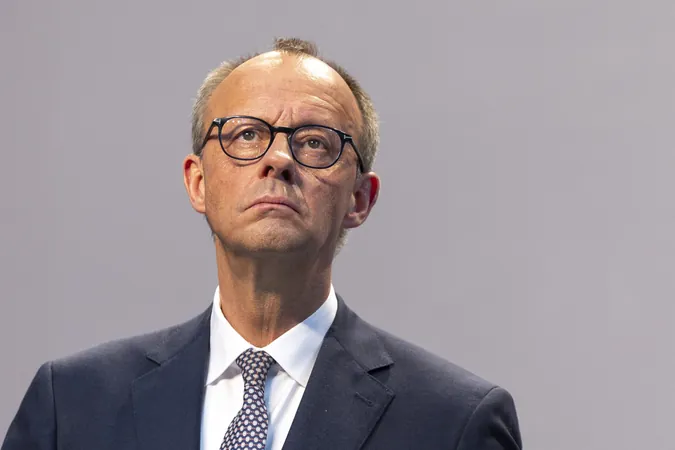
Friedrich Merz: Cornered as AfD Rises to the Top
2025-04-10
Author: Ting
Unprecedented Political Shift in Germany
Germany’s political landscape is witnessing a seismic shift as coalition talks, usually prolonged and contentious, concluded in a mere six weeks, birthing a new government. However, this rapid resolution might be costing the incoming Chancellor Friedrich Merz dearly in public support.
The Rise of the AfD: A Vote of Discontent
For the first time, the far-right Alternative for Germany (AfD) has surged to the top of major polls, capturing a staggering quarter of voter support. As Merz dismisses critiques from the AfD, insisting he no longer takes them seriously, the reality of increased political pressure is inescapable. His administration seems to be heading into a potentially tumultuous period.
Polls Show CDU/CSU in a Tight Race with AfD
Recent polling data reveal a dramatic rise in AfD support, putting Merz's conservative CDU/CSU party in a neck-and-neck battle with them, while their coalition partner, the SPD, stagnates at a mere 15%. The newly formed coalition is already facing the grim reality of diminished public backing.
Merz's Dwindling Credibility Following Election Promises
Although Merz initially gained support through a push for traditional conservatism, his party's recent electoral performance fell short of expectations, clinching just 28.5% of the vote instead of the anticipated 35%. Many voters remain skeptical about his ability to enact the promised "political change" on immigration, particularly his controversial vow for a "de facto ban" on visa-free entries.
Economic Challenges and Broken Promises
Almost immediately, Merz compromised on his pledge not to increase national debt, agreeing to a borrowing package of nearly €1 trillion for security and infrastructure. This move has shattered the fragile trust among conservative voters, with only a third believing he’s fit for leadership.
Internal Strife and a Hostage to the SPD
Adding to his woes, Merz faces dissent within his own party, particularly from grassroots members unhappy with negotiations with the SPD. Bound by a political firewall against the AfD, Merz finds himself with limited options, relying heavily on the minority SPD to maintain his government.
Potential Backlash of Failed Policies
Ironically, the very policies aimed at curbing AfD influence are pushing right-wing voters away from the CDU/CSU, as their desire for conservative governance goes unrecognized. This has left Merz’s future uncertain, with just four years to prove the worth of his agenda.
A Critical Time Ahead for Germany's Leadership
With the likelihood of economic difficulties if tariffs are implemented and the burden of debt-fueled initiatives weighing heavily, Merz's ability to navigate Germany's challenges will be crucial. He stands at a precarious juncture—one of the weakest starting positions in Germany’s post-war leadership history.
In a political climate charged with uncertainty and rising discontent, Merz faces the daunting task of restoring trust and stability in his administration—or risk an expedited downfall.





 Brasil (PT)
Brasil (PT)
 Canada (EN)
Canada (EN)
 Chile (ES)
Chile (ES)
 Česko (CS)
Česko (CS)
 대한민국 (KO)
대한민국 (KO)
 España (ES)
España (ES)
 France (FR)
France (FR)
 Hong Kong (EN)
Hong Kong (EN)
 Italia (IT)
Italia (IT)
 日本 (JA)
日本 (JA)
 Magyarország (HU)
Magyarország (HU)
 Norge (NO)
Norge (NO)
 Polska (PL)
Polska (PL)
 Schweiz (DE)
Schweiz (DE)
 Singapore (EN)
Singapore (EN)
 Sverige (SV)
Sverige (SV)
 Suomi (FI)
Suomi (FI)
 Türkiye (TR)
Türkiye (TR)
 الإمارات العربية المتحدة (AR)
الإمارات العربية المتحدة (AR)